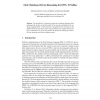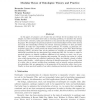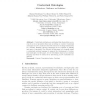140
click to vote
WWW
2011
ACM
14 years 9 months ago
2011
ACM
We propose a description-logic style extension of OWL 2 with nominal schemas which can be used like“variable nominal classes”within axioms. This feature allows ontology langua...
128
click to vote
DLOG
2010
15 years 4 days ago
2010
We describe Orel, a reasoning system for an ontology language which subsumes both the EL and the RL profile of the recently standardised web ontology language OWL 2. Orel performs ...
110
Voted
JAIR
2008
15 years 2 months ago
2008
In this paper, we propose a set of tasks that are relevant for the modular reuse of ontologies. In order to formalize these tasks as reasoning problems, we introduce the notions o...
105
click to vote
IADIS
2003
15 years 3 months ago
2003
Ontologies in a web setting, particularly those used in a group context (such as a virtual community), need to be flexible and open to changes that reflect the evolution of knowle...
137
click to vote
FOIS
2006
15 years 3 months ago
2006
Abstract. Across a wide range of domains, there is an urgent need for a wellfounded approach to incorporating uncertain and incomplete knowledge into formal domain ontologies. Alth...
117
click to vote
ASWC
2006
Springer
15 years 5 months ago
2006
Springer
The Web Ontology Language (OWL), which is a Description Logic based ontology language, is widely used to represent formal definitions of vocabularies for domain knowledge, especial...
132
click to vote
COOPIS
2002
IEEE
15 years 7 months ago
2002
IEEE
We extend the description logic ¢¤£¦¥¦§©¨ with a preference order on the axioms. With this strict partial order certain axioms can be overruled, if defeated with more ...
102
click to vote
CAISE
2004
Springer
15 years 7 months ago
2004
Springer
Abstract. The definition of a domain ontology is a complex activity that requires two kinds of expertise: a deep knowledge of the domain to be modeled and a good level of familiari...
112
Voted
CAISE
2004
Springer
15 years 7 months ago
2004
Springer
tween documents. They should allow for an abstract representation of data which resembles the way they are actually perceived and used in the real world, thus shortening (with resp...
173
click to vote
ADVIS
2006
Springer
15 years 8 months ago
2006
Springer
Abstract. Contextual ontologies are ontologies that characterize a concept by a set of properties that vary according to context. Contextual ontologies are now crucial for users wh...



